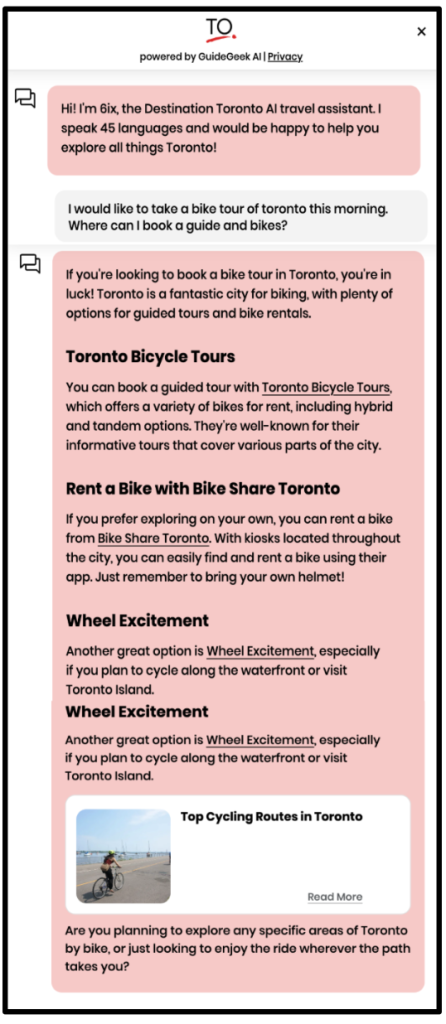Artificial Intelligence (AI) isn’t just nudging the travel booking industry forward. As is usually the case, the travel industry is a quick adopter of new internet tech (though not quite porn industry fast). Soon travellers will be able effortlessly discover, plan, and book trips with pinpoint accuracy and personalized convenience, all done by autonomous AI agents. Online Travel Agencies (OTAs) like Expedia and Booking.com are already aggressively adopting AI, setting new customer expectations for speed, ease, and customization.
For Destination Marketing Organizations (DMOs) and smaller tourism operators, adapting quickly will be critical. Here’s a primer on thriving in this robot-led revolution.
Now Serving Everyone
Say goodbye to exclusive concierge services reserved for the wealthy. AI-powered travel assistants, like Expedia’s ChatGPT integration and Kayak’s aggressive AI-driven price comparisons. are bringing custom travel planning to everyone’s fingertips. Simply chat naturally, and these robot wizards handle everything from itinerary details to the best deals.
For DMOs and small operators, it’s now essential to ensure your content is visible and optimized for these AI platforms. Forget traditional brochures; the AI game is about digital visibility, structured data, and getting noticed by algorithm-driven bots. (If that sounds a lot like SEO, it is.)
Ads That Talk Back
Static ads are old news. Meet conversational, interactive ads, the new digital rockstars. Consider the Chinese e-comm giants: they rolled out digital ads letting travelers directly ask questions and receive instant personalized replies, significantly outperforming traditional ads.
Big DMOs like Destination Toronto have already jumped onboard, creating interactive AI chatbots like “6ix”” delivering seamless, real-time recommendations that transform curious clicks into actual bookings.

Toronto’s 6ix Bot
AI Evens the Playing Field
We think AI will be the great equalizer. Smaller tourism operators historically outmatched by big-budget competitors now have accessible and affordable AI-driven tools for dynamic pricing, instant trend analysis, and automated marketing.
Consider tour operators like Railbookers and Travel Deliciously: By leveraging AI, they rapidly create high-quality marketing materials, optimize content, and cut hours spent on admin tasks. Small hotels and tour operators can similarly deploy AI chatbots to handle routine queries, allowing their teams to focus on high-value guest interactions.
Old-School SEO is New Again
Ranking on Google isn’t enough anymore. With AI-based search assistants like ChatGPT and Bing AI changing how travelers find information, traditional SEO alone won’t cut it. But don’t worry, the skies you’ve learned honing your site’s SEO are more relevant than ever. Enter “AI Agent Optimization” – the next-level SEO required to get your content picked up and recommended by AI assistants.
Businesses must optimize structured data, keep listings accurate, and strategically position themselves on key AI-friendly databases like Google Places and TripAdvisor, or risk becoming invisible to travellers.
Trust Issues
As the old saying goes, with great (AI) power comes great responsibility, and some thorny ethical dilemmas. Dilemmas that are as old as the internet, but now turned up to 11. For example, who’s accountable if your AI makes booking errors or biases recommendations? The answer is YOU. If you use AI, you take on the responsibility of being vigilant curators of what your AI tools are delivering to your customers. Don’t assume it’s all trustworthy, unbiased data – bots are still notorious hallucinators. Air Canada learned this the hard way last year.
Ensuring your AI-driven presence is accurate and authentic isn’t just good practice. It’s essential for your brand credibility and customer loyalty.
The Most Difficult Step is the First One
AI in travel isn’t a passing trend; it’s a fundamental shift in how people interact with travel content and services. DMOs must proactively educate local stakeholders, ensuring everyone’s AI-ready. Smaller operators must embrace AI gradually, first enhancing internal operations and customer interactions before scaling their digital capabilities. And it’s not as hard as you might think. The most difficult step is the first one – start by diving into some of the most basic tools. Try using ChatGPT in your daily life, and soon you’ll find your comfort level quickly rising.
Success in the coming years will go to those operators who embrace AI proactively, leveraging it to enhance visibility, guest engagement, and personalization without losing sight of the genuine human experiences that travelers seek. No robot will ever truly replace that human touch.

